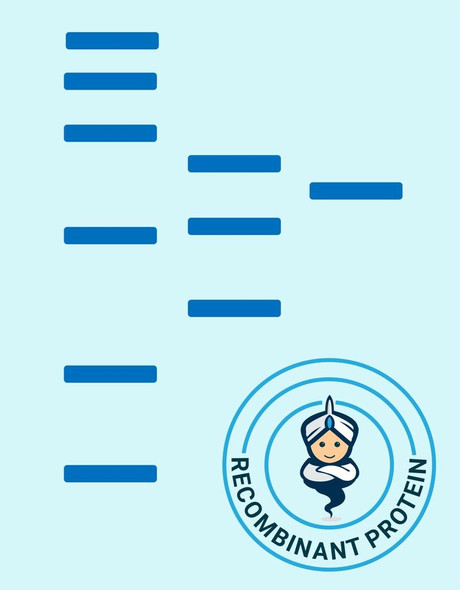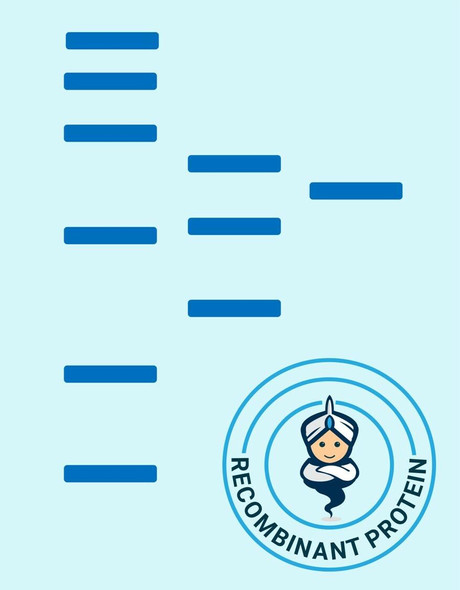Description
| Product Name: | Human RPLP2 Recombinant Protein |
| Product Code: | RPPB4503 |
| Size: | 20µg |
| Species: | Human |
| Target: | RPLP2 |
| Synonyms: | Ribosomal protein large P2, RPP2, MGC71408, P2, Renal carcinoma antigen NY-REN-44, D11S2243E, 60S acidic ribosomal protein P2, Acidic Ribosomal phosphoprotein P2. |
| Source: | Escherichia Coli |
| Physical Appearance: | Sterile filtered colorless solution. |
| Formulation: | RPLP2 protein solution (1mg/ml) containing 20mM Tris-HCl buffer (pH8.0), 100mM NaCl, 1mM DTT and 10% glycerol. |
| Stability: | Store at 4°C if entire vial will be used within 2-4 weeks. Store, frozen at -20°C for longer periods of time. For long term storage it is recommended to add a carrier protein (0.1% HSA or BSA).Avoid multiple freeze-thaw cycles. |
| Purity: | Greater than 95% as determined by SDS-PAGE. |
| Amino Acid Sequence: | MGSSHHHHHH SSGLVPRGSH MGSHMRYVAS YLLAALGGNS SPSAKDIKKI LDSVGIEADD DRLNKVISEL NGKNIEDVIA QGIGKLASVP AGGAVAVSAA PGSAAPAAGS APAAAEEKKD EKKEESEESD DDMGFGLFD |
Ribosomes, the organelles which catalyze protein synthesis, contain a small 40S subunit and a large 60S subunit. Together these subunits are composed of 4 RNA species and nearly 80 structurally distinct proteins. This gene encodes a ribosomal phosphoprotein which is a component of the 60S subunit. The protein, which is a functional equivalent of the E. coli L7/L12 ribosomal protein, is a member of the L12P family of ribosomal proteins and has a vital part in the elongation step of protein synthesis. In opposed to most ribosomal proteins, which are basic, the encoded protein is acidic.The P1 C-terminal end is nearly identical to the C-terminal ends of the ribosomal phosphoproteins P0 and P2. The P1 protein can interact with P0 and P2 to form a pentameric complex consisting of P1 and P2 dimers, and a P0 monomer. P1 is located in the cytoplasm. As is typical for genes encoding ribosomal proteins, there are multiple processed pseudogenes of this gene distributed all over the genome.
RPLP2 Human Recombinant produced in E.Coli is a single, non-glycosylated polypeptide chain containing 139 amino acids (1-115 a.a.) and having a molecular mass of 14.2kDa.RPLP2 is fused to a 24 amino acid His-tag at N-terminus & purified by proprietary chromatographic techniques.
| UniProt Protein Function: | RPLP2: Plays an important role in the elongation step of protein synthesis. Belongs to the ribosomal protein L12P family. |
| UniProt Protein Details: | Protein type:Translation; Ribosomal Chromosomal Location of Human Ortholog: 11p15.5 Cellular Component: focal adhesion; membrane; cytosol Molecular Function:structural constituent of ribosome; RNA binding Biological Process: SRP-dependent cotranslational protein targeting to membrane; translational elongation; cellular protein metabolic process; translation; viral reproduction; mRNA catabolic process, nonsense-mediated decay; translational initiation; gene expression; viral transcription; translational termination; viral infectious cycle |
| NCBI Summary: | Ribosomes, the organelles that catalyze protein synthesis, consist of a small 40S subunit and a large 60S subunit. Together these subunits are composed of 4 RNA species and approximately 80 structurally distinct proteins. This gene encodes a ribosomal phosphoprotein that is a component of the 60S subunit. The protein, which is a functional equivalent of the E. coli L7/L12 ribosomal protein, belongs to the L12P family of ribosomal proteins. It plays an important role in the elongation step of protein synthesis. Unlike most ribosomal proteins, which are basic, the encoded protein is acidic. Its C-terminal end is nearly identical to the C-terminal ends of the ribosomal phosphoproteins P0 and P1. The P2 protein can interact with P0 and P1 to form a pentameric complex consisting of P1 and P2 dimers, and a P0 monomer. The protein is located in the cytoplasm. As is typical for genes encoding ribosomal proteins, there are multiple processed pseudogenes of this gene dispersed through the genome. [provided by RefSeq, Jul 2008] |
| UniProt Code: | P05387 |
| NCBI GenInfo Identifier: | 133061 |
| NCBI Gene ID: | 6181 |
| NCBI Accession: | P05387.1 |
| UniProt Secondary Accession: | P05387,Q6FG96, |
| UniProt Related Accession: | P05387 |
| Molecular Weight: | 115 |
| NCBI Full Name: | 60S acidic ribosomal protein P2 |
| NCBI Synonym Full Names: | ribosomal protein, large, P2 |
| NCBI Official Symbol: | RPLP2�� |
| NCBI Official Synonym Symbols: | P2; LP2; RPP2; D11S2243E�� |
| NCBI Protein Information: | 60S acidic ribosomal protein P2; renal carcinoma antigen NY-REN-44; acidic ribosomal phosphoprotein P2 |
| UniProt Protein Name: | 60S acidic ribosomal protein P2 |
| UniProt Synonym Protein Names: | Renal carcinoma antigen NY-REN-44 |
| UniProt Gene Name: | RPLP2�� |
| UniProt Entry Name: | RLA2_HUMAN |






